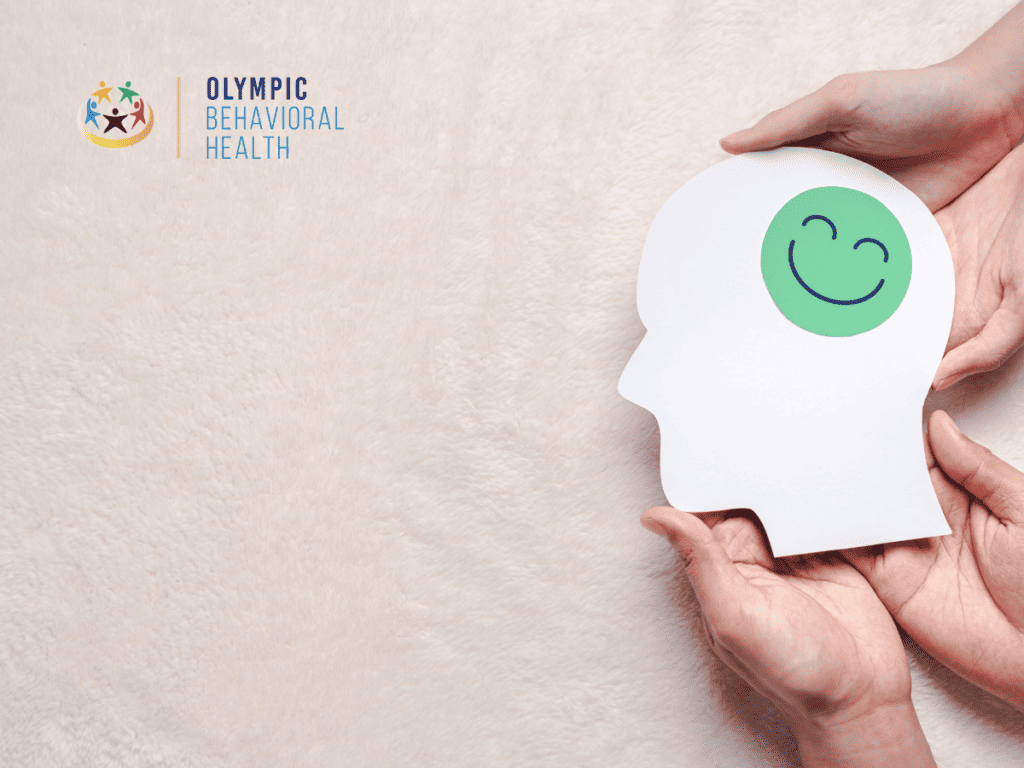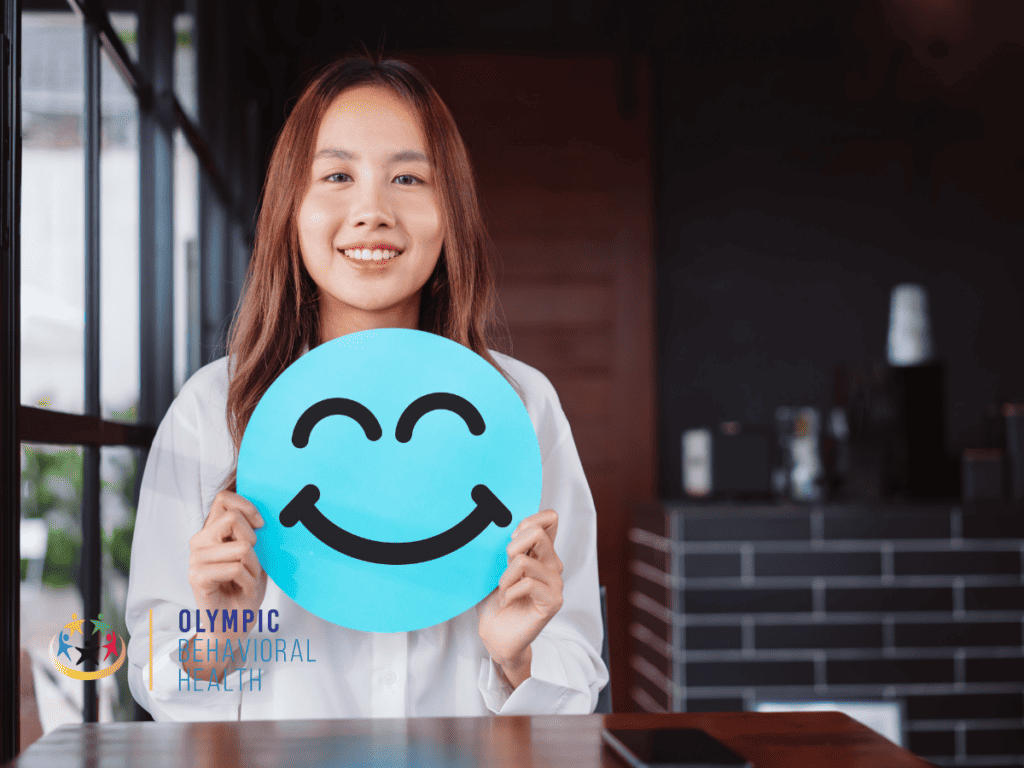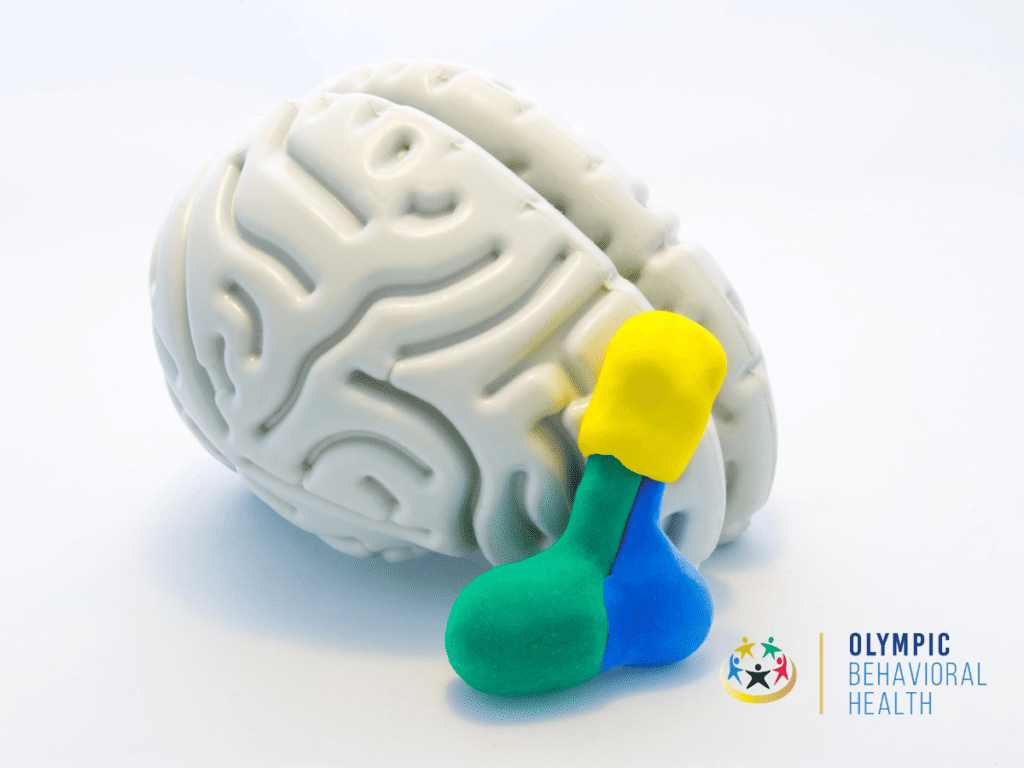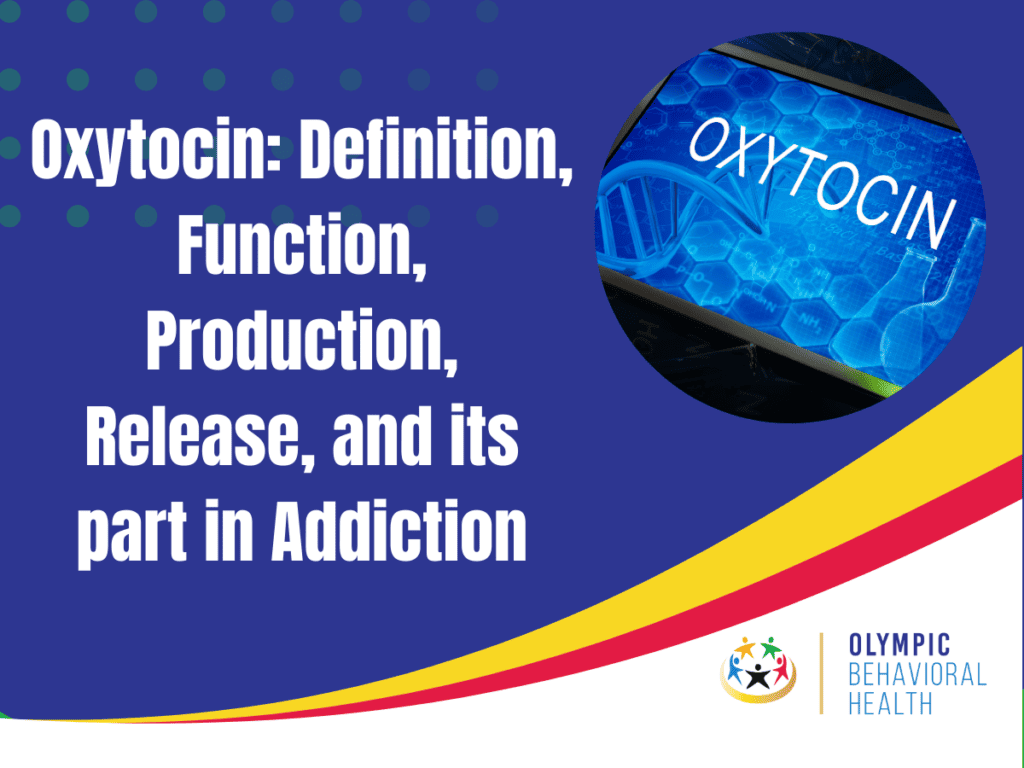Oxytocin is a hormone and neuropeptide that plays a crucial role in various physiological and behavioral functions, including lactation, sexual arousal, trust, and recognition. It is often referred to as the love hormone or bonding hormone due to its involvement in social bonding, maternal behavior, and romantic attachment.
In the body, oxytocin is primarily produced in the hypothalamus, a gland located in the forebrain, just below the thalamus. It is stored and released by the posterior pituitary into the bloodstream. It acts as a neurotransmitter in the brain and also has peripheral effects on other organs.
Oxytocin has been shown to modulate addictive behavior. A 2017study by Lee M.R. et al., titled ‘Targeting the Oxytocin System to Treat Addictive Disorders: Rationale and Progress to Date’ suggests that oxytocin helps prevent addiction and relapse by attenuating the reward effects of drug abuse, mitigating withdrawal symptoms, and reducing stress and cue-induced cravings.

What is Oxytocin?
Oxytocin is a hormone and neuropeptide that is naturally produced in the hypothalamus and is secreted by the posterior pituitary. It is sometimes referred to as the love hormone because it is released in response to social bonding activities such as hugging, kissing, and sexual intercourse.
Aside from social bonding, this hormone also plays a role in important physiological processes including reproduction, labor, and childbirth. During childbirth, it stimulates uterine contraction and afterward plays a role in milk production and maternal bonding.
Synthetic Forms of Oxytocin
Because of the role oxytocin plays in labor and safe childbirth, synthetic forms of the hormones are manufactured and available commercially for use in several aspects of healthcare and medical purposes.
These synthetic forms of oxytocin, also known as synthetic oxytocin analogs, are designed to mimic the effects of naturally occurring oxytocin and are used for several therapeutic interventions. Some common synthetic oxytocin analogs include:
- Pitocin
- Syntocinon
- Carbetocin (longer lasting than natural oxytocin)
Synthetic oxytocin analogs are typically used under medical supervision. They carry risks and side effects and are potentially dangerous if not used appropriately.

What Are The Functions of Oxytocin?
Oxytocin serves various important functions in the body, influencing physiological processes, psychological functions, and social behaviors. Here are some of its key functions:
Stimulating Uterine Contractions
Oxytocin plays a crucial role in childbirth by stimulating uterine contractions in the second and third stages of labor. This is especially important for cervical dilation during delivery, as it helps facilitate the progression of labor and the delivery of the baby.
Promoting Bonding and Attachment
Oxytocin is involved in social bonding and attachment between individuals. It is released in response to various social interactions such as hugging, kissing, and physical affection According to Alley J.C. and Diamond L.M. in their 2020 research paper ‘Oxytocin and Human Sexuality: Recent Developments’ females secrete oxytocin during sexual activities and helps in forming pair bonds with sexual partners, similar to the way vasopressin secretion acts in males. It also aids in the initiation of human maternal behavior. Generally, oxytocin boosts feelings of trust, empathy, and connection with others.
Facilitating Breastfeeding
Oxytocin is responsible for the milk ejection reflex. It enables breastfeeding mothers to release milk from their breasts to feed their infants. When infants suck on the nipple, the spinal nerves send a message to the hypothalamus, causing the production of oxytocin resulting in the secretion of oxytocin. The secreted oxytocin stimulates the contraction of myoepithelial cells around the milk ducts, causing milk to flow out into the nipples..
Reducing Stress and Anxiety
According to Yoon S. and Kim Y. in their 2020 paper titled ‘The Role of the Oxytocin System in Anxiety Disorders’ Oxytocin has been shown to have anxiolytic (anti-anxiety) effects and can help reduce stress levels. It works by dampening activity in the hypothalamic-pituitary-adrenal (HPA) axis, which is involved in the body’s stress response.
This integrated activity with the HPA and stress-related suggests the efficacy of exogenous oxytocin as a potential treatment for substance dependence.
Modulating Social Behavior
Oxytocin influences various aspects of social behavior including trust, generosity, cooperation, and emotional recognition.
According to a 2019 study by Pelloux Y. et al., ‘Social Modulation of Drug Use and Drug Addiction’ the positive impact of prosocial interactions and personal relationships aid in overcoming drug reward and protection from drug use.
Regulating Sexual Behavior
Oxytocin is involved in sexual arousal and orgasm in both men and women. According to Alley J.C. and Diamond L.M. in their 2020 research paper ‘Oxytocin and Human Sexuality: Recent Developments,’ oxytocin increases during sexual intercourse. It also contributes to the experience of intimacy and bonding during sexual activity.
Putative Treatment for Addiction
According to the Brain and Research Centre at the University of Sydney, the first approach to medicinally manage addiction is by stimulating social pathways so that the focus is shifted from pursuing and using addictive substances to more prosocial activities, and oxytocin is a vital substance in achieving this.
Oxytocin reduces all the negative behaviors and long-term consequences of substance use disorder such as withdrawal symptoms, anxiety, and depression, making it a potential treatment option for all stages of the addiction cycle.
Preventing Addiction
In their 2021 research paper ‘Oxytocin and Addiction: Potential Glutamatergic Mechanisms’ Sundar et al., imply that oxytocin aids in fighting tolerance to addictive drugs. Studies also suggest that higher concentrations of oxytocin are associated with lower susceptibility to addiction. This is because of the bidirectional role it plays with several systems that are involved in addiction.
How is Oxytocin Produced?
Oxytocin is primarily produced in the hypothalamus, a region of the brain located just above the brainstem and below the thalamus. Within the hypothalamus, oxytocin is synthesized in specialized neurons known as oxytocinergic neurons. These neurons contain large protein molecules called oxytocin precursors, which are synthesized based on instructions from the oxytocin gene.
After production, it is transported to the posterior pituitary where it is secreted into the bloodstream when stimulation occurs.
According to researchers from the Brain and Mind Centre at the University of Sydney, substance abuse and its damaging effect on brain pathways and structures means that people with substance use disorder are not getting the necessary release of oxytocin from social connections that they need for their recovery.
By implication, while substance abuse does not have a direct causal relationship with oxytocin production, it is established that addiction degrades the salience of social bonds. These social bonds are necessary for oxytocin production, and so people with addiction tend to release lower levels of oxytocin.
Release of Oxytocin
After production, oxytocin, in the form of pro-oxytocin, is stored at the axon terminals in structures known as Herring bodies until they receive signals triggering their release.
When stimulated, oxytocinergic neurons in the hypothalamus release oxytocin from the axon terminals into the bloodstream. This release is triggered by various stimuli, including uterine contractions during childbirth, suckling of the nipples during breastfeeding, physical touch, sexual activity, and emotional bonding.
Once released, oxytocin travels through the bloodstream to target organs and tissues, where it binds to oxytocin receptors located on various cells such as the uterus, mammary glands, brain, and other organs, leading to its physiological and psychological effects.
How is Oxytocin Controlled?
Oxytocin production is modulated by a positive feedback loop. The release of oxytocin creates actions that stimulate the pituitary gland to secrete more oxytocin.
This means that the secretion of oxytocin will continue until the action that triggered its initial release is stopped.

What is The Role of Oxytocin in Addiction?
The role oxytocin of oxytocin in addiction is still not fully understood. In a 2011 study, Sarynai tied oxytocin to addiction-relevant behaviors. These include the fact that the prosocial effects of popular recreational drugs are probably due to the stimulation of oxytocin systems and the chances of a relationship between the hormone and drug reward.
Mounting research proves that oxytocin influences addiction in the following ways:
Reward and Reinforcement
Oxytocin has been shown to interact with brain regions involved in the reward system, such as the nucleus accumbens, which plays a key role in addiction. This suggests that oxytocin plays a part in attenuating the rewarding effects of drug abuse, thereby reducing the likelihood of addictive behavior.
Stress and Anxiety
Oxytocin has anxiolytic (anti-anxiety) effects and has the potential to reduce stress responses. Stress and anxiety are known triggers for addictive behaviors and relapse. By modulating stress responses, oxytocin indirectly influences addictive behaviors by reducing the likelihood of using drugs or alcohol as coping mechanisms for stress and anxiety.
Cue-Induced Cravings
Oxytocin also seems to influence cue-induced cravings, which are intense urges to use drugs or engage in addictive behaviors triggered by environmental cues associated with past substance use. According to a review paper by Mellentin et al., named ‘The effectiveness of oxytocin for treating substance use disorders: A systematic review of randomized placebo-controlled trials’ oxytocin led to the reduction of cue-induced craving in subjects of 4 out of 7 studies.
Withdrawal Symptoms
Research also suggests that oxytocin plays a role in mitigating withdrawal symptoms associated with drug dependence. Various animal studies like the one done by Leong K. et al, titled ‘Oxytocin and Rodent Models of Addiction’ have shown that oxytocin administration reduces withdrawal symptoms such as anxiety-like behaviors in substance-dependent animals.
While these findings suggest that oxytocin may have potential therapeutic implications for addiction treatment, more research is needed to fully understand its mechanisms of action and its potential as a treatment target for addiction.
FAQ
Can Oxytocin Influence Social Behavior Beyond Bonding and Attachment?
Yes, oxytocin can influence social behavior beyond bonding and attachment. It also affects trust, empathy, generosity, and emotional recognition.
Is Oxytocin Involved in Parental Behaviors Beyond Maternal Bonding?
Yes, oxytocin contributes to paternal caregiving behaviors, promoting nurturing and protective responses in fathers during interactions with their infants.
How Does Oxytocin Reduce Stress and Anxiety Levels?
Oxytocin reduces stress by dampening activity in the hypothalamic-pituitary-adrenal axis, counteracting stress hormone effects, and promoting relaxation and calmness.
Can Oxytocin Administration Be Used as a Treatment for Addiction?
Research suggests oxytocin administration may reduce drug-seeking behaviors, attenuate drug rewards, and mitigate withdrawal symptoms and cue-induced cravings in addiction treatment, but further human studies are needed for validation.
Are There Factors That Can Influence Oxytocin Levels in the Body?
Positive social interactions, physical touch, emotional bonding, and hormonal changes like those during pregnancy can stimulate oxytocin release, while stress, social isolation, and negative emotions may inhibit it.
Can other medications also cause Addiction?
Yes, let’s have a look at some:
How is Habenula related to Addiction?
The habenula is a small brain structure that is involved in the regulation of reward and aversion responses.
Research has shown that dysfunction in the habenula can play a role in the development and maintenance of addiction. When exposed to drugs or other addictive substances, the habenula may become overactive, leading to increased feelings of aversion and negative emotions.
This can in turn drive individuals to seek out more of the substance in order to counteract these negative feelings. Therefore, targeting the habenula may hold promise for treating addiction in the future. To learn more about the connection between the habenula and addiction, read our article.
How is Cortisol related to Addiction?
Cortisol, also known as the stress hormone, plays a significant role in addiction. When someone experiences stressful situations, such as withdrawal symptoms, the body releases cortisol. This hormone activates the reward pathway in the brain, causing a craving for the addictive substance.
High levels of cortisol can also lead to increased impulsivity and decreased self-control, making individuals more susceptible to addictive behaviors. Furthermore, chronic stress and elevated cortisol levels can create permanent changes in the brain’s reward system, making addiction more difficult to overcome.
Therefore, reducing stress and cortisol levels through techniques such as mindfulness and exercise can be beneficial in treating and preventing addiction. When you want to learn more about cortisol and addiction, you can visit our article about it.
Get help for your Addiction
Addiction Treatment at Olympic Behavioral Health offers help and support for those struggling with addiction. Taking the first step can be difficult, but it is crucial to call for assistance. Our facility in West Palm Beach provides comprehensive addiction treatment programs to guide individuals towards recovery. If you or your loved one is battling addiction, reach out to Olympic Behavioral Health today.

Share This Post



